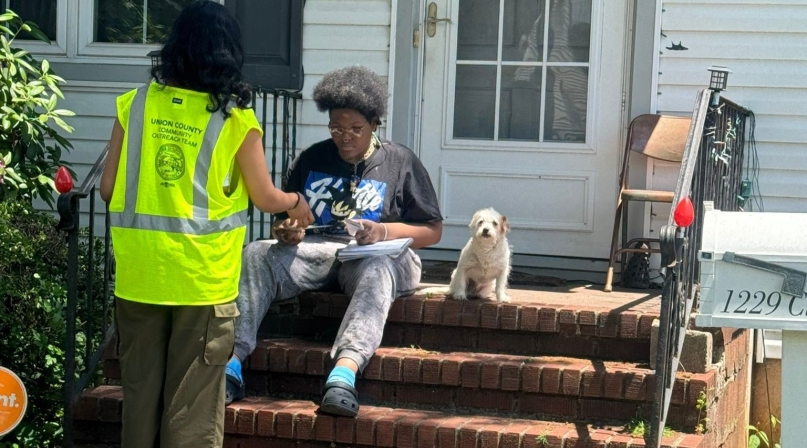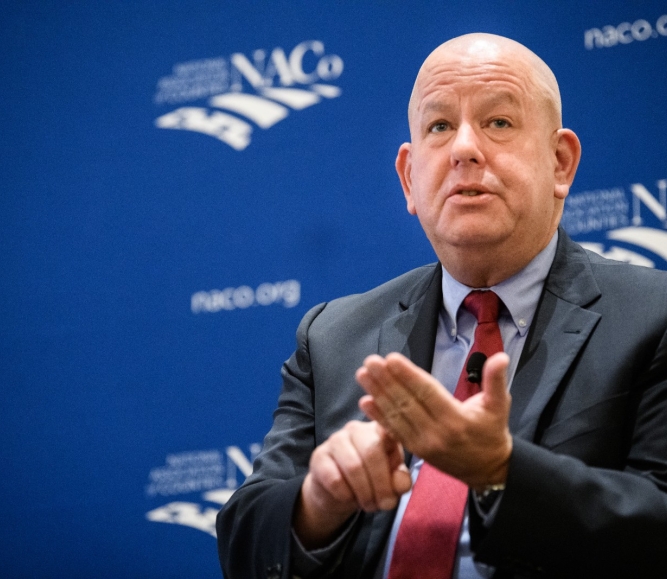Counties walk the walk on door-to-door outreach

Key Takeaways
Emails never seem to stop. A call on the phone is just as likely to be a scammer on the other side of the globe. A knock on the door?
It’s so quaint and whoever is there took the time to walk to your house. It’s worth an answer.
That’s what Union County, N.J. was banking on when it tried an age-old but overlooked tactic for reaching residents to make them aware of county services.
“We’ve found that if you’ve never asked for help before, you might not know how to ask for help,” said Deputy County Manager Amy Wagner. “For a lot of people experiencing challenges who aren’t used to working with the county, they might not even realize what options are out there. Or how to access them,”
During the COVID-19 pandemic, the county hired canvassers to inform residents about testing and vaccination processes, leaving door hangers with links to more information if no one answered. In years since, they have focused more on promoting human services programming, including food security, mental health, employment assistance and solar power assistance.
“We have mostly been promoting outward-facing things that our constituents would need and might not know about,” Wagner said. “There was a lot less uptake than we expected of the services that are available and we thought there was a good chance they just didn’t know much about them. We’re not short on need, but we just thought there were more people who would be interacting with the county if they knew what we offered.”
Rachel Holland agreed. She’s the New Jersey government relations liaison for the Civic Operations Group, which Union County (along with five others in the state), has contracted for canvassing outreach. She noted that a lot of media compete for residents’ attention, making it harder for counties’ outreach efforts to break through, even direct methods.
“I don’t really take much faith in the polling efforts because people don’t answer the phone these days,” she said. “Most of the time, we’re promoting programs that aren’t a secret, but if they’ve been printed anywhere in the newspaper, they’re probably on an inside page and people haven’t seen it.”
Holland noted that even targeted advertising on social media sites like Facebook was having diminishing returns for counties hoping to spread their news.
“It might be a matter of not having the right algorithm, but beyond that, people are busy and if you’re working and managing a family, it might not occur to you to seek out what the county is offering,” she said. “I think that some people, even if they aren’t expecting it, are refreshed when they open the door and find someone from the county trying to help them out.”
Union County doesn’t profile the communities it canvasses.
“We’re very socioeconomically diverse, but there’s need everywhere, even right in those very affluent suburbs,” Wagner said. “We don’t make assumptions about particular ZIP codes.
“People have mental health challenges in all kinds of households. We don’t want people to be forgotten because of where they live.”
The canvassers the group hires receive daily training and wear ID badges and bright vests bearing the county seal to identify them. They get clearance to do door-to-door communications, circumventing anti-solicitation ordinances. County officials help lend some legitimacy to the canvassers by appearing with them at public events, with faith communities and organizations like the YMCA, informing members that the county is sending people to go door-to-door. Some counties send “reverse 911” messages to residents to tell them the canvassers are not solicitors.
The contractor gives the county regular updates with the number of doors knocked, resident contacts and services that caught their attention.
And Union County’s efforts have already caught the eye of a local nonprofit leader, who has asked to distribute copies of the flyers that canvassers leave.
“As government entities, we get criticized regularly for things that we do and how we spend money,” Wagner said. “I did not get one negative piece of feedback about this program. Not one. Wow, everything that we heard back was positive.”
Related News

House Agriculture Committee introduces 2026 Farm Bill
On February 13, House Agriculture Committee Chairman G.T. Thompson (R-Pa.-15) introduced the House version of the 2026 Farm Bill, the Farm, Food, and National Security Act of 2026.

USDA and HHS release new dietary guidelines
On January 7, U.S. Department of Agriculture Secretary Brooke Rollins and U.S. Department of Health and Human Services Secretary Robert F. Kennedy, Jr. unveiled the new Dietary Guidelines for Americans, 2025–2030.
County News
Census outreach should focus on hard-to-count populations

